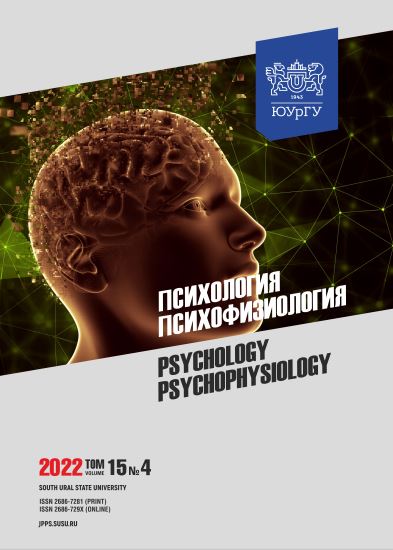Development and validation of the error propensity questionnaire
Abstract
Introduction. A person quite often makes errors, defined as an unintentional, accidental deviation from correct actions or thoughts, which represents the difference between the expected value and the real one. A fairly large number of studies deal with errors as a phenomenon. However, in the psychological literature, there is a lack of methods that measure erroneous behavior. Therefore, the prevention and correction of erroneous behavior require developing and validating a psychodiagnostic test that reveals a person's propensity for mistakes as a stable behavioral trend (as defined by A. Asmolov). The attitude theory (D. Uznadze) can be used as a methodological basis for such a technique. Aim: the purpose of this paper is to develop and validate the error propensity questionnaire. Materials and methods. The study included 329 respondents (128 women and 201 men aged 18 to 52 years, mean age 31.0 + 8.6 years). The following methods were used: the Revised Neo Personality Inventory (by P. Costa and R. McCrae; adapted by V. Orel, I. Senin); the Cognitive Distortions Scale (by R. Covin; adapted by T. Kryukova et al.); the Ellis’ Irrational Beliefs System (adapted by A. Kamenyukin, D. Kovpak); the authors’ Error Propensity Questionnaire (EPQ). Data processing was carried out with Statistica 10.0, Jamovi, Psych, and Lavaan packages in the “R” computing environment (RStudio 3.6). Results. Exploratory and confirmatory factor analysis confirmed the validity of a three-factor EPQ model, which includes the following scales: propensity for operational errors, propensity for target-related errors, and propensity for semantic errors. Internal consistency, discriminatory power, retest reliability, and convergent and external validity were also confirmed. Conclusions. The data obtained demonstrate the sufficient reliability and validity of the Error Propensity Questionnaire, its compliance with psychometric requirements, and its applicability.
Downloads
References
2. Covin R., Dozois D.J.A., Ogniewicz A. et al. Measuring Cognitive Errors: Initial Development of the Cognitive Distortions Scale (CDS). International Journal of Cognitive Therapy. 2011;4(3):297–322.
3. Kryukova T.L., Ekimchik O.A., Hohlova Yu.A., Kirpichnik O.V. The phenomenon of cognitive distortions of subjective assessments of life phenomena and its measurement (primary Russian-language adaptation of the Cognitive Distortion Scale – CDS). Vestnik KGU. Seriya: Pedagogika. Psihologiya. Sociokinetika = Bulletin of the Kostroma State University. Series: Pedagogy. Psychology. Sociokinetics. 2018;(4):61–67. (in Russ.).
4. Uznadze D.N. Psihologiya ustanovki [Psychology of attitude]. St. Petersburg, Piter Publ. 2001:416. (in Russ.).
5. Norman D. Dizain privychnykh veshchei [Design of everyday things]. Moscow, Vilyams Publ. 2006:364. (in Russ.).
6. Reason J. Human error: models and management. Western Journal of Medicine. 2000;172(6):393–396.
7. Bechtereva N.P., Shemyakina N.V., Starchenko M.G., Danko S.G., Medvedev S.V. Error detection mechanisms of the brain: Background and prospects. International Journal of Psychophysiology. 2005;58(2-3):227–234.
8. Bodrov V.A., Orlov V.Ya. Psikhologiya i nadezhnost: chelovek v sistemakh upravleniya tekhnikoi [Psychology and reliability: man in control systems of equipment]. Moscow, Institut psihologii RAN Publ. 1998:288. (in Russ.).
9. Festinger L. Teoriya kognitivnogo dissonansa [Theory of cognitive dissonance]. St. Petersburg, Yuventa Publ. 1999:317. (in Russ.).
10. Allahverdov V.M. Soznanie kak paradoks (Eksperimentalnaya psihologika) [Consciousness as a paradox (Experimental psychology)]. St. Petersburg, DNK Publ. 2000:528. (in Russ.).
11. Kaneman D., Slovik P., Tverski A. Prinyatie reshenii v neopredelennosti: Pravila i predubezhdeniya [Decision Making under Uncertainty: Rules and Bias]. Kharkiv, Gumanitarnyi centr Publ. 2005:632. (in Russ.).
12. Kamenyukin A.G., Kopak D.V. Stress-menedzhment [Stress management]. St. Petersburg, Piter Publ. 2012:208. (in Russ.).
13. Kondakov I.M. Teoriya ustanovki Uznadze [Uznadzes attitude theory]. Psihologiya. Illyustrirovannyi slovar [Psychology. Illustrated Dictionary]. St. Petersburg, Prajm-Evroznak Publ. 2007:592–593. (in Russ.).
14. Asmolov A.G. Po tu storonu soznaniya: metodologicheskie problemy neklassicheskoi psikhologii [Beyond Consciousness: Methodological Problems of Non-Classical Psychology]. Moscow, Smysl Publ. 2002:480. (in Russ.).
15. Baturin N.A., Melnikova N.N. Tekhnologiya razrabotki psihodiagnosticheskih metodik [Technology for the development of psychodiagnostic methods]. Chelyabinsk, YUUrGU Publ. 2012:135.
(in Russ.).
16. Orel V.E., Senin I.G. Lichnostnye oprosniki NEO PI-R i NEO FFI: rukovodstvo po primeneniyu [NEO PI-R and NEO FFI personality questionnaires: instructions for use]. Yaroslavl, Psihodiagnostika Publ. 2008:40. (in Russ.).
17. Kenny D.A. Measuring model fit. URL: http://www.davidakenny.net/cm/fit.htm (accessed: 26.07.2022).
18. Van de Schoot R., Lugtig, P., Hox J. A checklist for testing measurement invariance. European Journal of Developmental Psychology. 2012;9:486–492.
References on translit
-Copyright (c) 2022 Psychology. Psychophysiology

This work is licensed under a Creative Commons Attribution-NonCommercial-NoDerivatives 4.0 International License.



